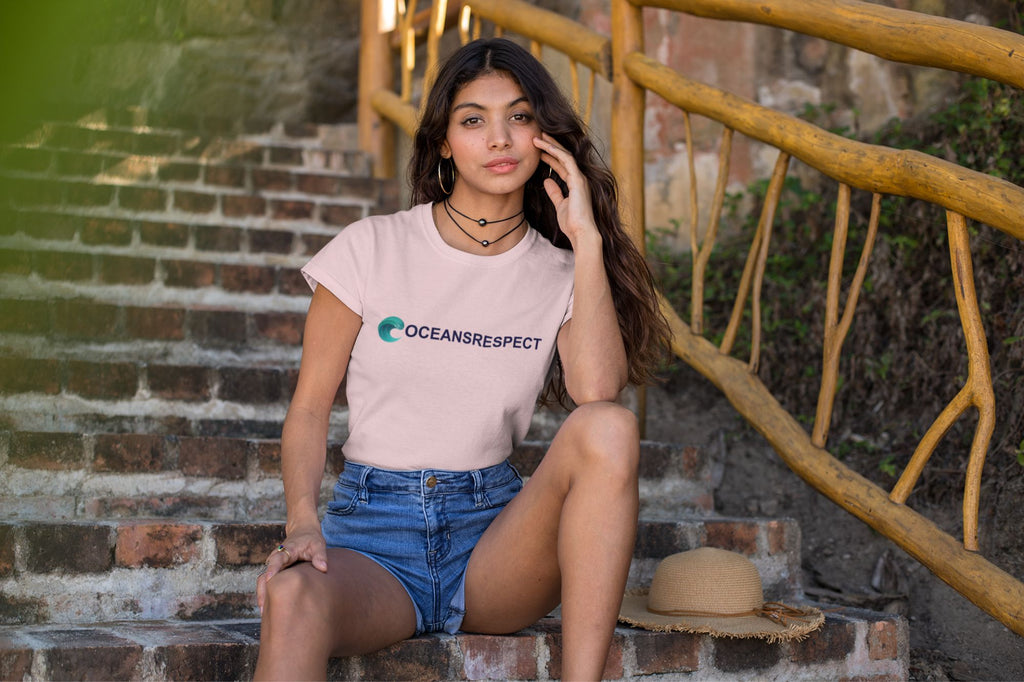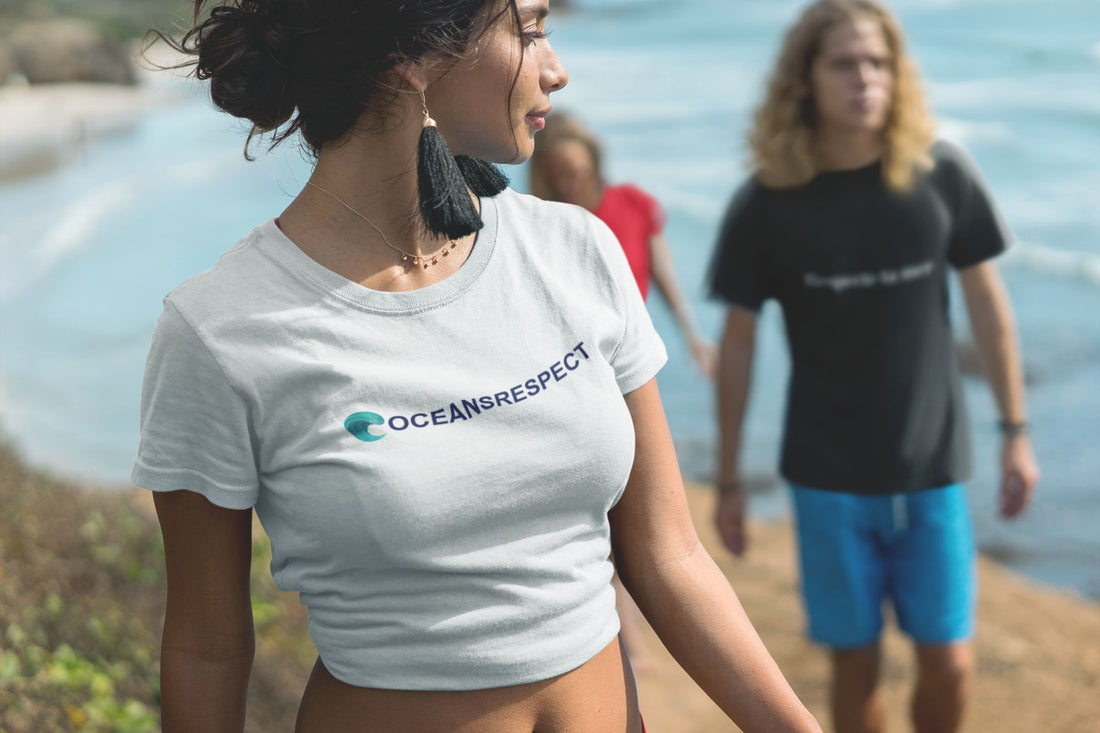In a world facing increasing environmental challenges, the need to make responsible choices in all aspects of our daily lives has become more pressing than ever. The fashion industry, in particular, is often singled out for its negative impact on the environment, particularly with regard to ocean pollution. However, there are sustainable alternatives that can help alleviate these problems, and organic cotton is a notable example.

Introduction to organic cotton
Organic cotton, unlike its conventional counterpart, is grown using sustainable agricultural practices that preserve soil health, reduce water consumption and eliminate the use of harmful chemical pesticides. This environmentally friendly cultivation method promotes biodiversity and protects the health of farmers and local communities.
One of the most important characteristics of organic cotton is its absence of synthetic pesticides. Unlike conventional cotton, which is one of the most intensively pesticide-treated crops, organic cotton uses natural methods such as crop rotation, cover planting, and the use of beneficial insects to control pests. . This approach significantly reduces agricultural workers' exposure to toxic chemicals and preserves the health of surrounding ecosystems, including oceans.
In addition to its environmentally friendly cultivation method, organic cotton is also free from genetically modified (GMO) seeds, which helps maintain the genetic diversity of crops and prevent potential risks to health and the environment. associated with GMOs.
In conclusion, organic cotton represents a sustainable and environmentally friendly alternative to conventional cotton. Its ecological cultivation method helps reduce the environmental footprint of the textile industry and protect our precious marine ecosystems, including the oceans. In the following sections, we will explore in detail the many environmental benefits of organic cotton and its positive impact on preserving our oceans.

Summary
- Introduction
- Section 1: The environmental benefits of organic cotton
- Differences between conventional cotton and organic cotton
- Sustainable Organic Cotton Growing Methods
- Section 2: The positive impact on the oceans
- Reduction of ocean pollution through organic cotton
- Importance of preserving marine biodiversity
- Section 3: Certifications and labels to look for
- Global Organic Textile Standard (GOTS)
- Oeko-Tex
- Section 4: Brands offering organic cotton clothing
- Patagonia
- People Tree
- Thought
- Pact
- Oceansrespect
- Conclusion

Section 1: The environmental benefits of organic cotton
When it comes to choosing between conventional cotton and organic cotton, it is essential to understand the fundamental differences between these two production methods and the environmental benefits associated with organic cotton.
Differences between conventional cotton and organic cotton
Conventional cotton is grown on a large scale using intensive agricultural practices that involve the use of chemical pesticides, synthetic fertilizers and genetically modified seeds. These chemicals can have adverse effects on soil health, biodiversity and water quality, and they can also contaminate surrounding ecosystems, including oceans.
In contrast, organic cotton is grown without the use of chemical pesticides or synthetic fertilizers. Instead, farmers adopt sustainable agricultural practices such as crop rotation, cover planting and composting to maintain soil health and prevent plant diseases. These environmentally friendly methods preserve the biodiversity of agricultural ecosystems and reduce the negative impact on marine ecosystems, such as the oceans.
Sustainable Organic Cotton Growing Methods
Organic cotton production relies on sustainable growing methods that promote soil health, water conservation and environmental protection. Crop rotation, for example, allows farmers to grow a variety of plants on their land, which helps prevent soil nutrient depletion and reduces the need to use synthetic chemicals.
Additionally, water management is a priority in organic cotton production. Farmers use techniques such as drip irrigation and rainwater harvesting to minimize water consumption and conserve local water resources. This responsible approach to water management helps reduce pressure on aquatic ecosystems, including oceans.
Finally, the absence of harmful chemical pesticides in organic cotton cultivation ensures the health of soil, plants, animals and humans. By avoiding the use of toxic substances, farmers protect biodiversity and preserve the integrity of terrestrial and marine ecosystems.
In conclusion, sustainable growing methods used in organic cotton production offer many environmental benefits over conventional cotton. By adopting environmentally friendly agricultural practices, organic cotton farmers help protect soil health, preserve biodiversity and reduce the negative impact on marine ecosystems, such as oceans.

Section 2: The positive impact on the oceans
The oceans, which cover more than 70% of the Earth's surface, play a crucial role in regulating climate, providing oxygen and regulating water cycles. However, these valuable marine ecosystems are threatened by a variety of factors, including human-caused pollution. Organic cotton offers a sustainable solution to reduce the impact of the textile industry on the oceans and protect marine biodiversity.
Reducing ocean pollution
One of the main ways organic cotton helps protect the oceans is by avoiding the use of pesticides and toxic chemicals in its production. Unlike conventional cotton, which is treated with a multitude of synthetic pesticides to control pests and diseases, organic cotton is grown without the use of these harmful chemicals. By avoiding pollution of soil and water by pesticides, organic cotton helps preserve the health of marine ecosystems and reduce ocean contamination.
Additionally, sustainable agricultural practices used in organic cotton production promote the conservation of soil and water resources, which also helps reduce ocean pollution. By minimizing soil erosion and preventing contamination of waterways with agricultural chemicals, organic cotton helps preserve water quality and maintain healthy marine ecosystems.
Preservation of marine biodiversity
Marine biodiversity is essential to the health and resilience of ocean ecosystems. However, pollution, overfishing and climate change threaten the diversity of marine species globally. By opting for organic cotton clothing , consumers can help preserve marine biodiversity by reducing demand for products produced from environmentally destructive agricultural practices.
By choosing organic cotton clothing, consumers are sending a strong message to the textile industry, showing that they support sustainable and environmentally friendly agricultural practices. This growing demand for biodiversity-friendly products encourages companies to adopt more sustainable practices throughout their supply chain, helping to preserve the health of marine ecosystems for future generations.
In conclusion, organic cotton offers a significant positive impact on ocean protection by reducing pollution and preserving marine biodiversity. By switching to organic cotton clothing, consumers can help alleviate pressures on marine ecosystems and promote a more sustainable and environmentally friendly textile industry.

Section 3: Certifications and labels to look for
When purchasing organic cotton clothing, it is essential to look for certifications and labels that guarantee quality, authenticity and sustainable practices throughout the supply chain. Two of the most renowned certifications in this field are the Global Organic Textile Standard (GOTS) and Oeko-Tex.
Global Organic Textile Standard (GOTS)
GOTS is one of the most recognized certifications for organic textile products worldwide. This standard ensures that organic cotton clothing meets strict criteria throughout its production, from cotton cultivation to the final product. Key GOTS requirements include the use of certified organic fibers, a ban on toxic pesticides and hazardous chemicals, and strict standards for working conditions and fair treatment of workers.
By achieving GOTS certification, brands commit to high standards of sustainability and social responsibility. Consumers can therefore have confidence in the quality and authenticity of organic cotton clothing bearing this label.
Oeko-Tex
Oeko-Tex is another important label to look for when purchasing organic cotton clothing . Although Oeko-Tex does not specifically guarantee that products are made from organic cotton, it does certify that textiles have been tested for harmful substances and meet strict health and safety standards. This includes testing for pesticide residues, heavy metals, azo dyes and other potentially harmful chemicals.
Although Oeko-Tex is not an organic certification, it provides additional assurance to consumers regarding the safety and quality of the clothing they purchase. Products bearing the Oeko-Tex label are free of toxic substances and meet high standards of sustainability and safety.
In conclusion, by seeking certifications such as GOTS and Oeko-Tex, consumers can be confident that their organic cotton clothing is authentic, sustainable and eco-friendly. These labels provide a guarantee of quality and responsibility throughout the supply chain, thus helping to promote more ethical and sustainable fashion.

Section 4: Brands offering organic cotton clothing
When looking for organic cotton clothing, it's crucial to choose brands that place a premium on sustainability, transparency, and ethics in their manufacturing process. Here are some of the renowned brands that stand out for their commitment to organic cotton:
1. Patagonia
Patagonia is recognized for its deep commitment to sustainability and ethics. Their range of GOTS certified organic cotton clothing includes t-shirts, hoodies, jackets and more. In addition to organic cotton, Patagonia also uses other sustainable materials like recycled polyester and recycled nylon. The brand is committed to minimizing its environmental impact by adopting responsible production practices and supporting environmental conservation initiatives.
2. PeopleTree
People Tree is a pioneering brand in ethical and fair trade fashion. Their GOTS certified organic cotton clothing collection is made in partnership with organic cotton producers in India. They offer a wide range of clothing for men and women, including dresses, shirts, pants and accessories. People Tree is committed to providing fair working conditions for their artisans and supporting sustainable agricultural practices.
3. Thought
Thought, formerly known as Braintree Clothing, is a British brand specializing in eco-friendly and sustainable clothing. Their range of GOTS certified organic cotton clothing includes casual wear, sleepwear, underwear and accessories. Thought strives to minimize its environmental impact by using natural materials like hemp, bamboo and organic cotton, and supporting ethical production practices.
4. Pact
Pact is a US-based organic clothing brand that offers a wide range of clothing made from GOTS certified organic cotton. Their collection includes essential basics like t-shirts, leggings, underwear and pajamas for men, women and children. In addition to their commitment to organic cotton, Pact is also Fair Trade certified, ensuring fair working conditions for workers throughout their supply chain.
5. Oceansrespect
Oceansrespect is a brand dedicated to ocean conservation and environmental sustainability. Their range of organic cotton clothing is made with GOTS certified fibres, ensuring high standards of sustainability and eco-friendliness throughout the production process. Oceansrespect is committed to raising awareness of the environmental challenges facing our oceans and contributing to their protection through eco-responsible products.
By choosing brands like Patagonia, People Tree, Thought, Pact and Oceansrespect, consumers can be assured of the quality, authenticity and positive impact of their organic cotton clothing. These brands exemplify the fashion industry's growing commitment to sustainability and offer stylish and ethical options for those who want to make responsible choices.

Conclusion
In this article, we explored the importance of organic cotton clothing in preserving our oceans and the environment as a whole. By opting for organic cotton clothing, consumers can help reduce ocean pollution, preserve marine biodiversity and promote sustainable agricultural practices.
Why choose organic cotton clothing?
Organic cotton clothing offers many advantages over conventional cotton. Their production uses sustainable agricultural practices such as crop rotation, water management and the absence of harmful chemical pesticides. By avoiding the use of toxic substances, organic cotton helps reduce soil, air and water pollution, thereby preserving the health of terrestrial and marine ecosystems.
Choose certified brands committed to sustainability
When purchasing organic cotton clothing , it is important to choose brands that are certified and committed to sustainability. Certifications such as the Global Organic Textile Standard (GOTS) and Oeko-Tex ensure that products meet strict standards for quality, authenticity and sustainability. By supporting these brands, consumers can encourage more ethical and responsible fashion.
In conclusion, every purchase counts. By opting for organic cotton clothing and choosing brands committed to sustainability, we can all help preserve our oceans and protect the environment for future generations. Let's make responsible choices and together, build a more sustainable future.
Don't forget to share this article with your friends and family to increase awareness about the benefits of organic cotton clothing and the importance of making responsible choices in our daily lives. Together we can make a difference.



